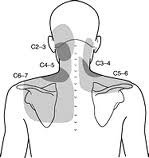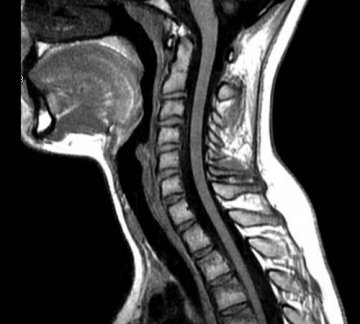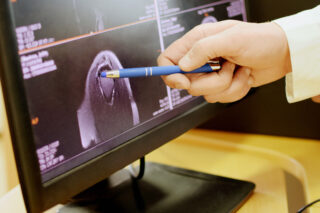Neck problems
About two thirds of the population will be affected by neck pain at some time in their life. The peak incidence occurs in middle age. About 15% of hospital physiotherapy appointments are for patients with neck pain.
The majority of people will suffer from ‘simple neck pain’. This is likely to be shortlived resolving days or weeks. They may have a mechanical or postural problem.

More chronic pain maybe related to degenerative changes, this is often termed cervical spondylosis. This is condition is poorly defined and a label that is frequently given to patients.
Cervical spondylosis
Symptoms are usually neck pain or referred around the shoulder girdle which is usually aggravated by neck movements. It is related to dengeration within cervical spine. Patients may report vague numbness or tingling in the upper limbs but do not show signs of radiculopathy.
Whiplash injury to the neck
This is a common injury particularly after road traffic accident. This is usually a rear end impact. Symptoms of localised pain and stiffness appear soon after the accident. Pain can be isolated to the neck or radiate to the shoulder or down the arm.
The majority or symptoms settle within 3 months, however some people can get persistent symptoms beyond two years after injury. There are several factors which may result in a worse outcome such as previous neck injury, previous cervical spondylosis or neurological symptoms. Read more
Cervical radiculopathy
When the nerve roots that exit from the neck are irritated the condition of cervical radiculopathy can occur. This is like sciatica of the cervical spine. Either a disc prolapse or degenerative changes irritate the nerve roots. This produces neck pain and a burning type pain that radiates down the arm in the distribution of the nerve that is being irritated. The great majority of symptoms will settle with conservative measures such as physiotherapy.
Cervical myeolopathy
This is where the spinal canal in the neck is narrowed secondary to degenerative changes. Patients can present pith vague but not severe neck pain. Clumsiness of both hands and lack of co-ordination is common. People can also complain of poor walking and balance problems.
Treatment
Treatment of acute neck pain includes use of analgesics, mobilisation rather than immobilisation. Attention to posture and stress is also important. In chronic neck pain there are many treatment options. There is no strong evidence to support one particular treatment method and often a pragmatic approach is recommended.
Use of physiotherapy with mobilisation strengthening manipulation and proprioception can be used with use of painkillers.
Neck pain with neurological problems. Radiculopathy or suspected myeolopathy which is not resolving will usually require investigation with MRI scan to look to see if there is a disc prolapse or a cord narrowing.
Picture shows a MRI of the cervical spine.

Andrew Brooksbank

CONSULTING HOURS
CONTACT DETAILS
CONDITIONS
Treatment journey
APPOINTMENTS
Make a consultantion appointment wiith Mr Andrew Brooksbank at BMI Ross Hall Glasgow.
FAQ’s
Frequently asked questions about appointments, treatment, recovery and insurance/payments.

